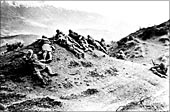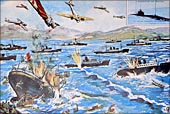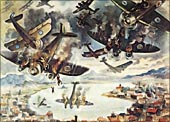|
|
 |
 |
 |
 |
| The Greek-Italian war
The enthusiasm of the Greek army, the spontaneous catholic support for the war and the mountainous masses of Epirus made feasible not only the effective routing of the Italian troops but also a spectacular counter-offensive by the Greeks inside Albanian territory. The Battle of Greece took a total of 216 days and can be divided into three phases; starting with the initial defence of the homeland (28/10/40 to 13/11/40), it moved on to the impetuous counter-offensive which led to the occupation of important cities and other locations in North Epirus (14/11/40 to 28/12/49), and culminated in an even deeper advance into Albanian territory with the crushing of the notorious 'spring attack' by the Italians (29/12/40 to 5/4/41).
The overall result was the immobilization of 27 Italian divisions in Albania by 16 Greek ones and the expansion of the Greek frontiers by 60 kilometres into Albanian territory, an event construed as the liberation of Greek territories in North Epirus.
At the same time, the Greek fleet was battlling hard at sea protecting Greek transportation and harassing that of the Italians, and also safeguarding the shores from enemy landings and bombardment. The Greek fleet scored exceptional victories against the Italians, while the submarine 'Papanikolis' and its lieutenant-commander, Miltonas Iatridis, acquired the status of a symbol. In addition the Greek airforce, though poorly equipped, joined the battle by taking on the far superior Italian airforce.
The unexpected Greek victory against the Italians was the first victory of any Ally against the Axis forces and was hailed with enthusiasm by the entire fighting world. The Germans themsleves even admired the Greeks' achievement. Moreover, it had enormous importance. It broke the myth of the omnipotence of the Axis, encouraged determined but wary people to resist, and destroyed the prestige of Mussolini while delaying Hitler's scheduled attack on Russia.
|
 |
 |
|








